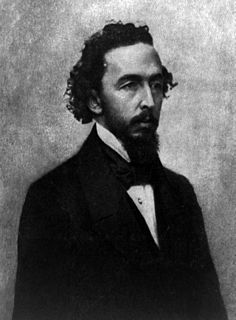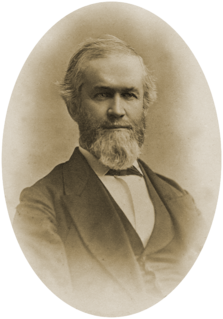A Quote by Bayard Taylor
So far as regards their moral character, the Finns have as little cause for reproach as any other people.
Related Quotes
An important advance in the life of a people is the transformation of the religion of fear into the moral religion. But one must avoid the prejudice that regards the religions of primitive peoples as pure fear religions and those of the civilized races as pure moral religions. All are mixed forms, though the moral element predominates in the higher levels of social life. Common to all these types is the anthropomorphic character of the idea of God.
Amongst other strange things said of me, I hear it is said by the deists that I am one of the number; and indeed, that some good people think I am no Christian. This thought gives me much more pain than the appellation of Tory; because I think religion of infinitely higher importance than politics; and I find much cause to reproach myself that I have lived so long, and have given no decided and public proofs of my being a Christian. But, indeed, my dear child, this is a character which I prize far above all this world has, or can boast.
But, sir, the great cause of complaint now is the slavery question, and the questions growing out of it. If there is any other cause of complaint which has been influential in any quarter, to bring about the crisis which is now upon us; if any State or any people have made the troubles growing out of this question, a pretext for agitation instead of a cause of honest complaint, Virginia can have no sympathy whatever, in any such feeling, in any such policy, in any such attempt. It is the slavery question. Is it not so?
Politics and the pulpit are terms that have little agreement. No sound ought to be heard in the church but the healing voice of Christian charity. The cause of civil liberty and civil government gains as little as that of religion by this confusion of duties. Those who quit their proper character to assume what does not belong to them are, for the greater part, ignorant both of the character they leave and of the character they assume.
To be beneficent when we can is a duty; and besides this, there are many minds so sympathetically constituted that, without any other motive of vanity or self-interest, they find a pleasure in spreading joy around them, and can take delight in the satisfaction of others so far as it is their own work. But I maintain that in such a case an action of this kind, however proper, however amiable it may be, has nevertheless no true moral worth, but is on a level with other inclinations. . . . For the maxim lacks the moral import, namely, that such actions be done from duty, not from inclination.
To scatter praise or blame without regard to justice is to destroy the distinction of good and evil. Many have no other test of actions than general opinion; and all are so far influenced by a sense of reputation that they are often restrained by fear of reproach, and excited by hope of honour, when other principles have lost their power.

































